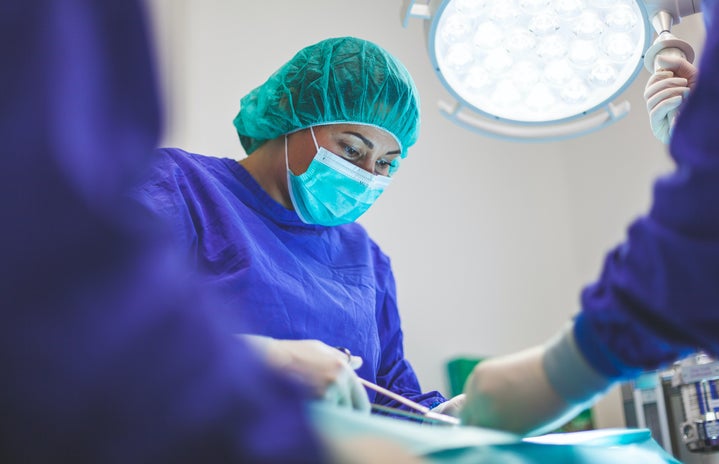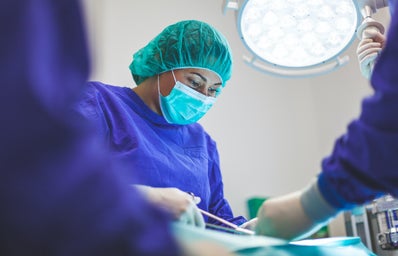It has not even been a year since I discovered my dream career and realized I want to pursue medicine. Since I was little, I had always viewed hospitals as a scary place — often picturing the long hallways lit with white fluorescent bulbs and sitting in extremely cold waiting rooms after my dad had a stroke. I always told myself I would avoid hospitals and never pictured myself dreaming of working in one. That all changed after I had surgery this past February and truly realized the life-changing power that healthcare workers have. Not long after, I cold-called my anesthesiologist from that same surgery and asked her if I could shadow her for the summer.
I spent 160 hours shadowing a team of anesthesiologists in the surgical department of a major Miami hospital for the entire summer and had the most unique experience I could have ever asked for. Every morning for a month, I would wake up at 5 a.m. and take the hour-long car ride to the hospital filled with excitement as to what I would get to experience that day. Every day, I learned lessons about science, the American healthcare system and more than I ever thought I could learn about myself.
These are the lessons I learned while shadowing health care workers during a pandemic:
If you never ask, you never know
Hospitals are extremely busy — even more so during a pandemic. While shadowing doctors and nurses, I realized how busy a workday is for them, and as glad as they are to have people shadowing them and appreciating what they do for a living, they do not have time to check on you constantly. If you need something or have a question you must put yourself out there to be noticed — something I was unaccustomed to as I grew up very shy.
Your body language tells people more than you think it does
On my first day at the hospital, I was paired with an operating room nurse who took me in when all the anesthesiologists were busy. He turned to me and said, “Don’t cross your arms. You look insecure.” I never realized how much your body language tells others. After that, I noticed my own posture and nonverbal signals, as well as others’, more. Just by looking at an individual’s body language you could see which nurses and doctors were excited, tired, well rested and, or, worried. I often noticed this in the patients who were nervous and in such a vulnerable position. While it was something I never really paid attention to, an individual’s body language really says a thousand words.
The resources available to doctors during the pandemic were extremely scarce
The first thing I noticed when I walked into the anesthesia office was a massive frame filled with a collage of pictures of all the members working at the beginning of the pandemic. They were all covered from head to toe in protective suits, goggles, shields and layers upon layers of face masks, but still, they all had smiles on their faces. I quickly learned through conversations that the pandemic was extremely hard on health care professionals, specifically because they lacked the resources necessary for them to stay safe. During the first few weeks of the pandemic, when the spread left many hospitalized, and the hospital was unable to provide them with resources, many mentioned that they had bought their own protective gear. I think it is crucial to recognize all the sacrifices health care workers make, and continue to make, during this pandemic to take care of their patients.
Technology is very prominent in healthcare
When shadowing in the surgical department, I observed that most steps that surgeons and anesthesiologists take during their days require technology. Whether it is getting medications from a cabinet, pushing the correct dose into a patient’s IV or opening the doors to the operating room, anesthesiologists face the rising use of technology in hospitals. This became even more evident to me when I watched my first robotic surgery — something I only heard of and never truly was able to imagine. Still, I was fascinated by the fact that a robot could perform surgery on an actual patient and in a much less invasive way than any surgeon could. Quickly, I became captivated by the fact that technology is such a central aspect in hospitals and that its growth could eventually start replacing people’s jobs.
An efficient surgical department requires a large team
I wasn’t aware of how many people it takes to assemble a smooth-running surgical department in a major hospital. From the people sitting at the operating room control center who ensure that each room is scheduled correctly, to the nurses who run the operating rooms, the huge team of anesthesiologists, the pre-op and post-op nurses, the house physicians and the surgeons; everyone plays a part in ensuring patients receive the best care possible. The public rarely sees what really goes into an individual’s surgery, but at least 15 people encounter each patient and there are dozens of patients each day. It was truly fascinating to see how everyone did their own job yet still impacted the web of tasks that needed to be completed.
Spending my summer shadowing a team of anesthesiologists truly changed my life and allowed me to see further than the scary image I envisioned since I was little. This once in a lifetime opportunity taught me so much and allowed me to grasp what healthcare workers experienced during a pandemic. Seeing medical professionals give their all to help their patients and provide them a better quality of life was extremely inspiring and an experience I would not trade for anything in the world.


